 SEA ASSET President Ferdinand Marcos Jr. boards one of two new gunboats the Philippines has acquired from Israel and which, among others, will be part of naval patrol operations in the West Philippine Sea. Marcos commissioned the BRP Gener Tinangag and BRP Domingo Deluana on Friday, May 26, 2023, the 125th anniversary of the Philippine Navy. PHOTO BY RENE H. DILAN
SEA ASSET President Ferdinand Marcos Jr. boards one of two new gunboats the Philippines has acquired from Israel and which, among others, will be part of naval patrol operations in the West Philippine Sea. Marcos commissioned the BRP Gener Tinangag and BRP Domingo Deluana on Friday, May 26, 2023, the 125th anniversary of the Philippine Navy. PHOTO BY RENE H. DILAN
THE two newly commissioned gunboats of the Philippine Navy will be deployed to the West Philippine Sea as the government shifts its focus “more towards external defense of our borders,” President Ferdinand Marcos Jr. said on Friday.
The President witnessed the commissioning of the two Israeli-made fast attack interdiction craft (FAIC) during ceremonies in Manila marking the Navy’s 125th anniversary.
He stressed the need to build up the country’s defense capabilities, citing the “changing tides” of national security.
“Oh yes. Lahat ‘yan ginagamit talaga natin pang patrolya, hindi lamang sa West Philippine Sea kung hindi pagka diyan sa civil defense (All of those are actually being used for patrols, not just in the West Philippine Sea but also for civil defense),” Marcos told reporters covering the event.
He said the new gunboats “will now be part of the inventory of the country’s ships that will be used both for the defense from external forces and also for civil defense to help in disaster operations.”
“In this crucial transition, full support for the Armed Forces must be guaranteed, especially for the Philippine Navy’s priority goals of enhancing its intelligence, defense, and coordinative capabilities,” he said.
The FAICs were named BRP Gener Tinangag and BRP Domingo Deluana — after Medal of Valor awardees Corporal Gener Tinangag and Sergeant Domingo Deluana who were killed in action.
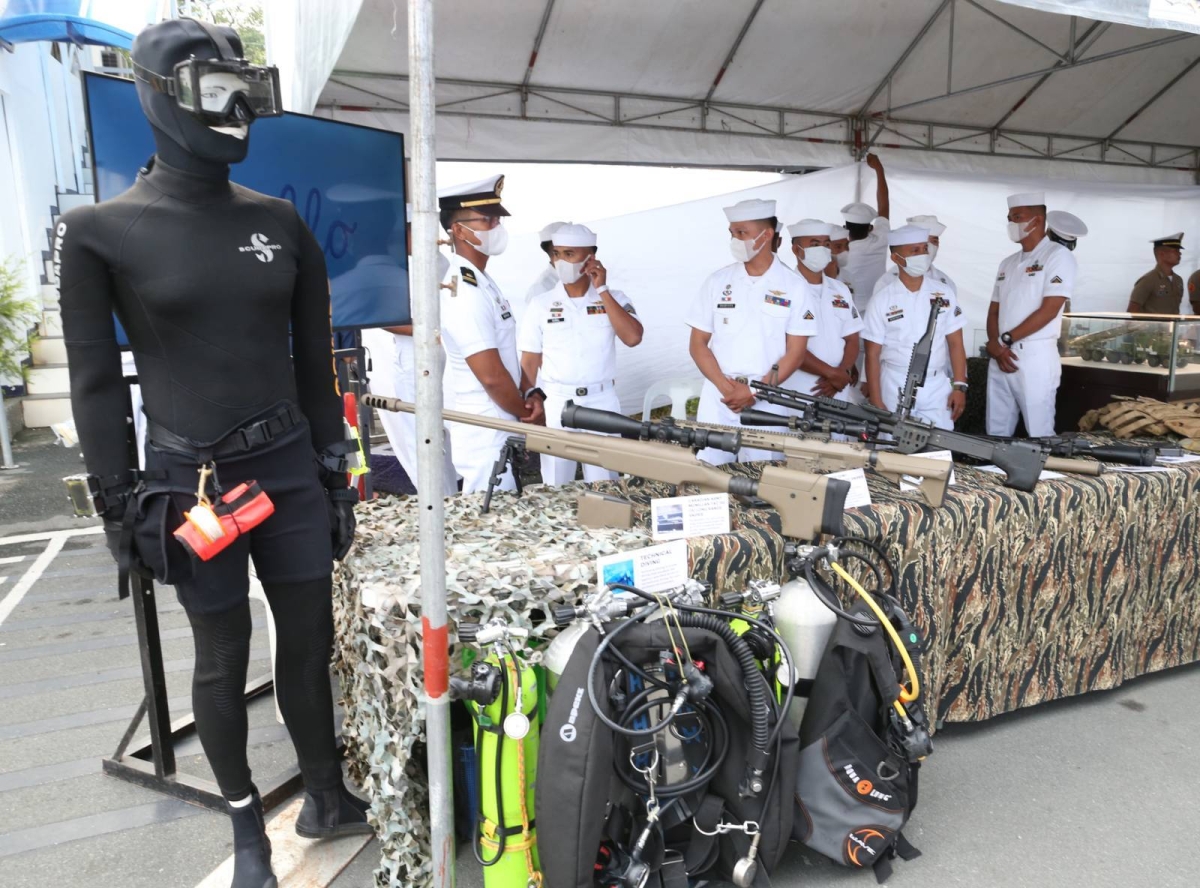 President Ferdinand Marcos Jr. and Philippine Navy officials board one of two new gunboats the Philippines has acquired from Israel and which will, among others, be part of naval patrol in the West Philippine Sea. Marcos commissioned the BRP Gener Tinangag and BRP Domingo Deluana on Friday, May 26, 2023, the 125th anniversary of the Philippine Navy. PHOTOS BY RENE DILAN
President Ferdinand Marcos Jr. and Philippine Navy officials board one of two new gunboats the Philippines has acquired from Israel and which will, among others, be part of naval patrol in the West Philippine Sea. Marcos commissioned the BRP Gener Tinangag and BRP Domingo Deluana on Friday, May 26, 2023, the 125th anniversary of the Philippine Navy. PHOTOS BY RENE DILAN
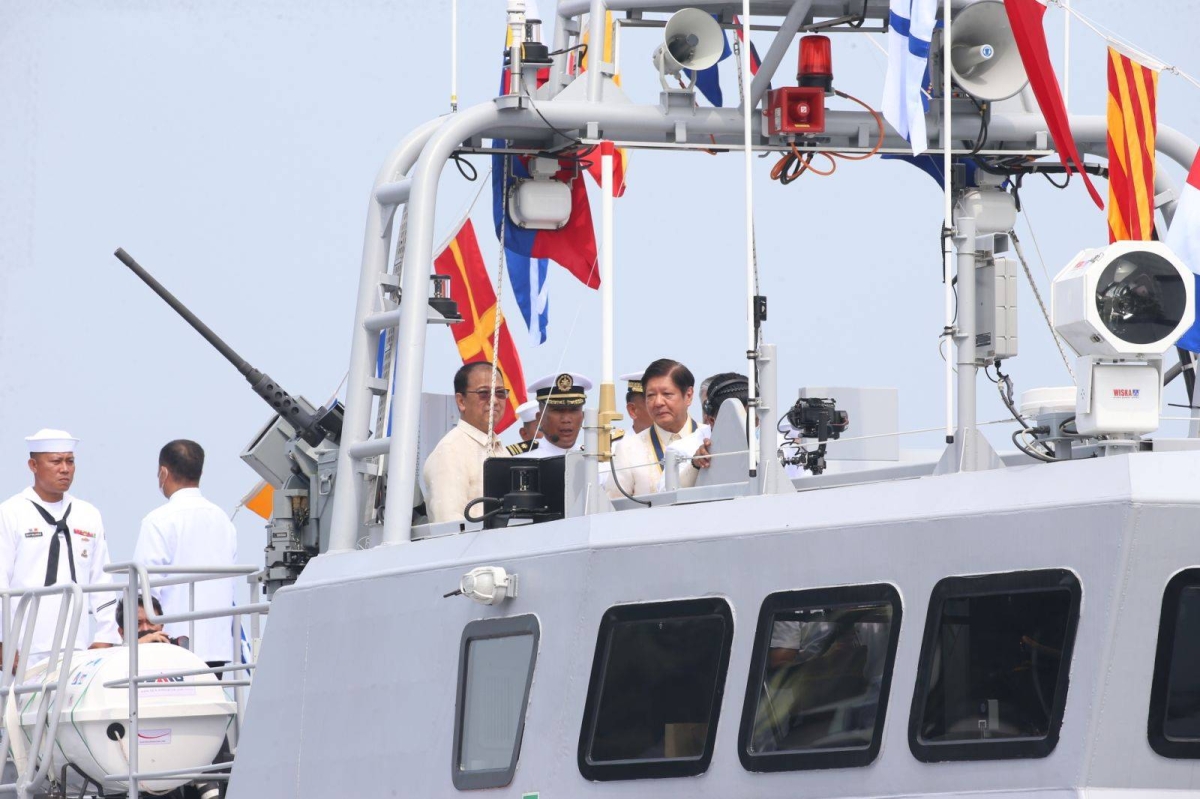 President Ferdinand Marcos Jr. and Philippine Navy officials board one of two new gunboats the Philippines has acquired from Israel and which will, among others, be part of naval patrol in the West Philippine Sea. Marcos commissioned the BRP Gener Tinangag and BRP Domingo Deluana on Friday, May 26, 2023, the 125th anniversary of the Philippine Navy. PHOTOS BY RENE DILAN
President Ferdinand Marcos Jr. and Philippine Navy officials board one of two new gunboats the Philippines has acquired from Israel and which will, among others, be part of naval patrol in the West Philippine Sea. Marcos commissioned the BRP Gener Tinangag and BRP Domingo Deluana on Friday, May 26, 2023, the 125th anniversary of the Philippine Navy. PHOTOS BY RENE DILAN
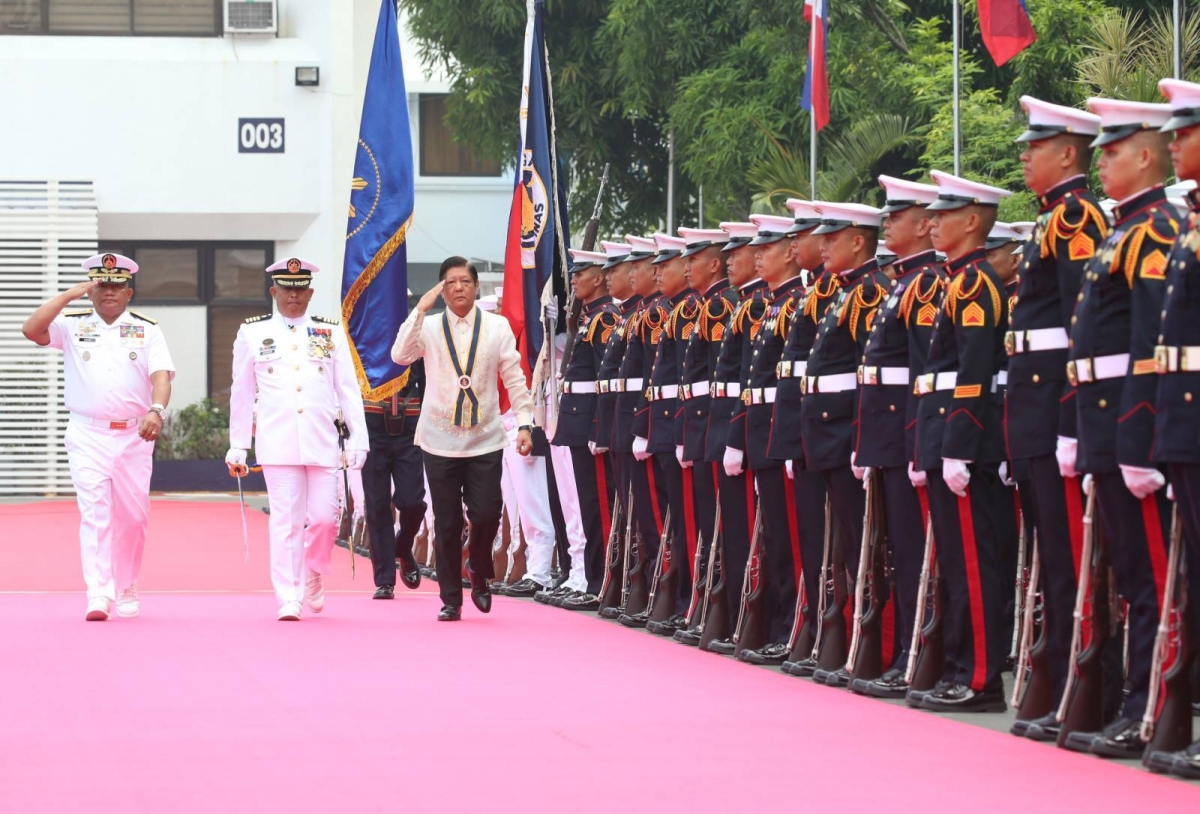 President Ferdinand Marcos Jr. and Philippine Navy officials board one of two new gunboats the Philippines has acquired from Israel and which will, among others, be part of naval patrol in the West Philippine Sea. Marcos commissioned the BRP Gener Tinangag and BRP Domingo Deluana on Friday, May 26, 2023, the 125th anniversary of the Philippine Navy. PHOTOS BY RENE DILAN
President Ferdinand Marcos Jr. and Philippine Navy officials board one of two new gunboats the Philippines has acquired from Israel and which will, among others, be part of naval patrol in the West Philippine Sea. Marcos commissioned the BRP Gener Tinangag and BRP Domingo Deluana on Friday, May 26, 2023, the 125th anniversary of the Philippine Navy. PHOTOS BY RENE DILAN
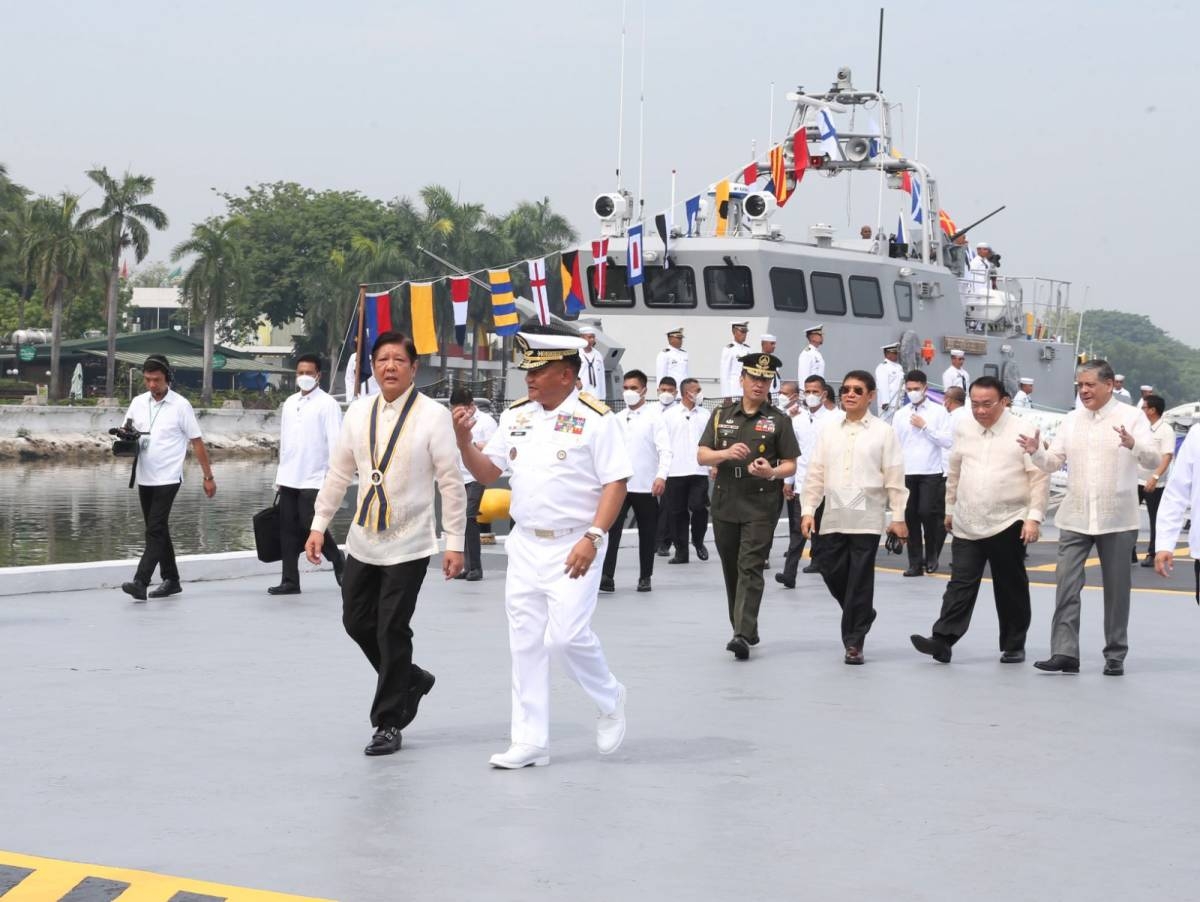 President Ferdinand Marcos Jr. and Philippine Navy officials board one of two new gunboats the Philippines has acquired from Israel and which will, among others, be part of naval patrol in the West Philippine Sea. Marcos commissioned the BRP Gener Tinangag and BRP Domingo Deluana on Friday, May 26, 2023, the 125th anniversary of the Philippine Navy. PHOTOS BY RENE DILAN
President Ferdinand Marcos Jr. and Philippine Navy officials board one of two new gunboats the Philippines has acquired from Israel and which will, among others, be part of naval patrol in the West Philippine Sea. Marcos commissioned the BRP Gener Tinangag and BRP Domingo Deluana on Friday, May 26, 2023, the 125th anniversary of the Philippine Navy. PHOTOS BY RENE DILAN
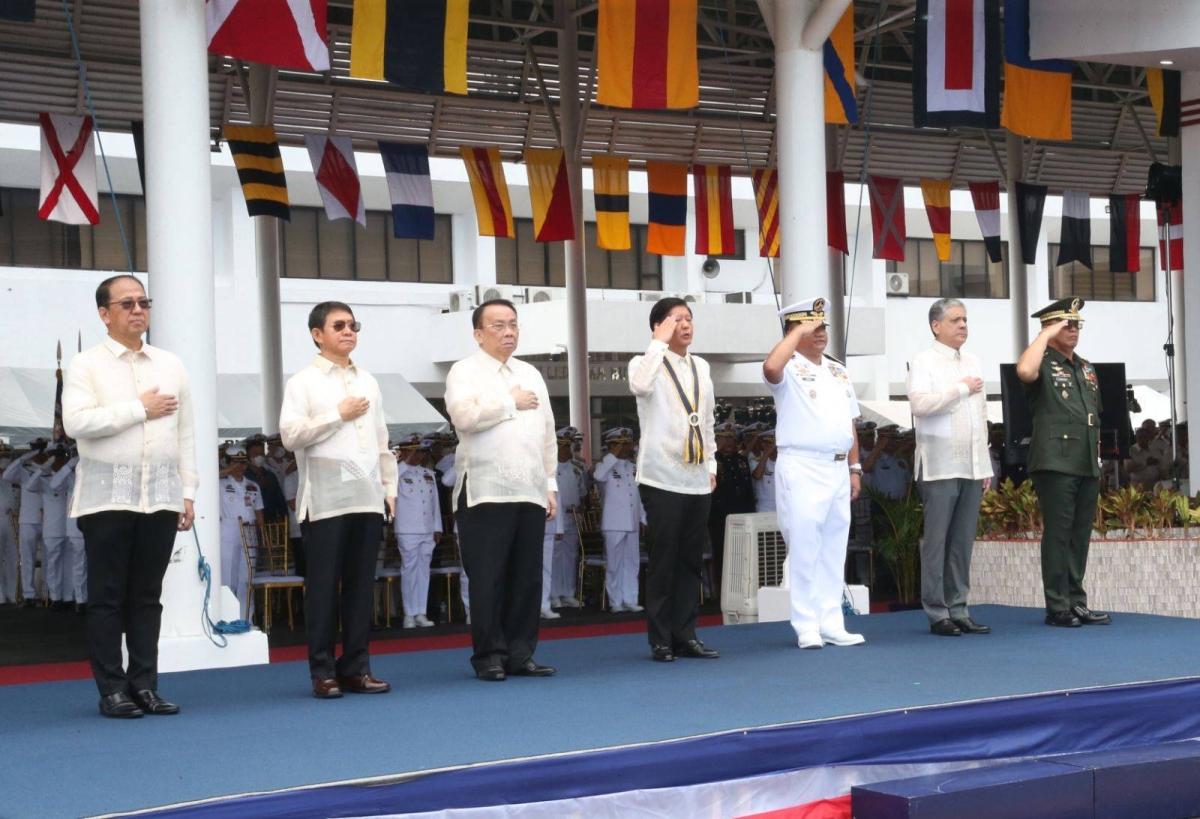 President Ferdinand Marcos Jr. and Philippine Navy officials board one of two new gunboats the Philippines has acquired from Israel and which will, among others, be part of naval patrol in the West Philippine Sea. Marcos commissioned the BRP Gener Tinangag and BRP Domingo Deluana on Friday, May 26, 2023, the 125th anniversary of the Philippine Navy. PHOTOS BY RENE DILAN
President Ferdinand Marcos Jr. and Philippine Navy officials board one of two new gunboats the Philippines has acquired from Israel and which will, among others, be part of naval patrol in the West Philippine Sea. Marcos commissioned the BRP Gener Tinangag and BRP Domingo Deluana on Friday, May 26, 2023, the 125th anniversary of the Philippine Navy. PHOTOS BY RENE DILAN
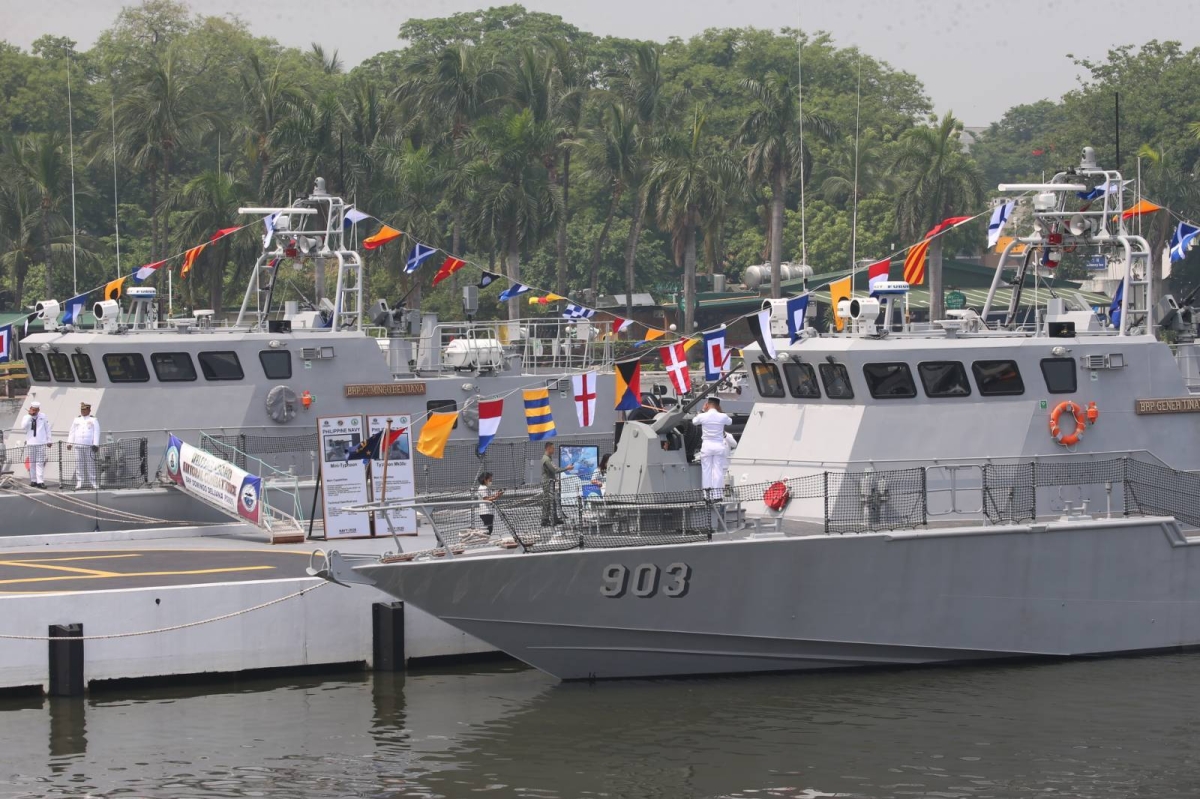 President Ferdinand Marcos Jr. and Philippine Navy officials board one of two new gunboats the Philippines has acquired from Israel and which will, among others, be part of naval patrol in the West Philippine Sea. Marcos commissioned the BRP Gener Tinangag and BRP Domingo Deluana on Friday, May 26, 2023, the 125th anniversary of the Philippine Navy. PHOTOS BY RENE DILAN
President Ferdinand Marcos Jr. and Philippine Navy officials board one of two new gunboats the Philippines has acquired from Israel and which will, among others, be part of naval patrol in the West Philippine Sea. Marcos commissioned the BRP Gener Tinangag and BRP Domingo Deluana on Friday, May 26, 2023, the 125th anniversary of the Philippine Navy. PHOTOS BY RENE DILAN
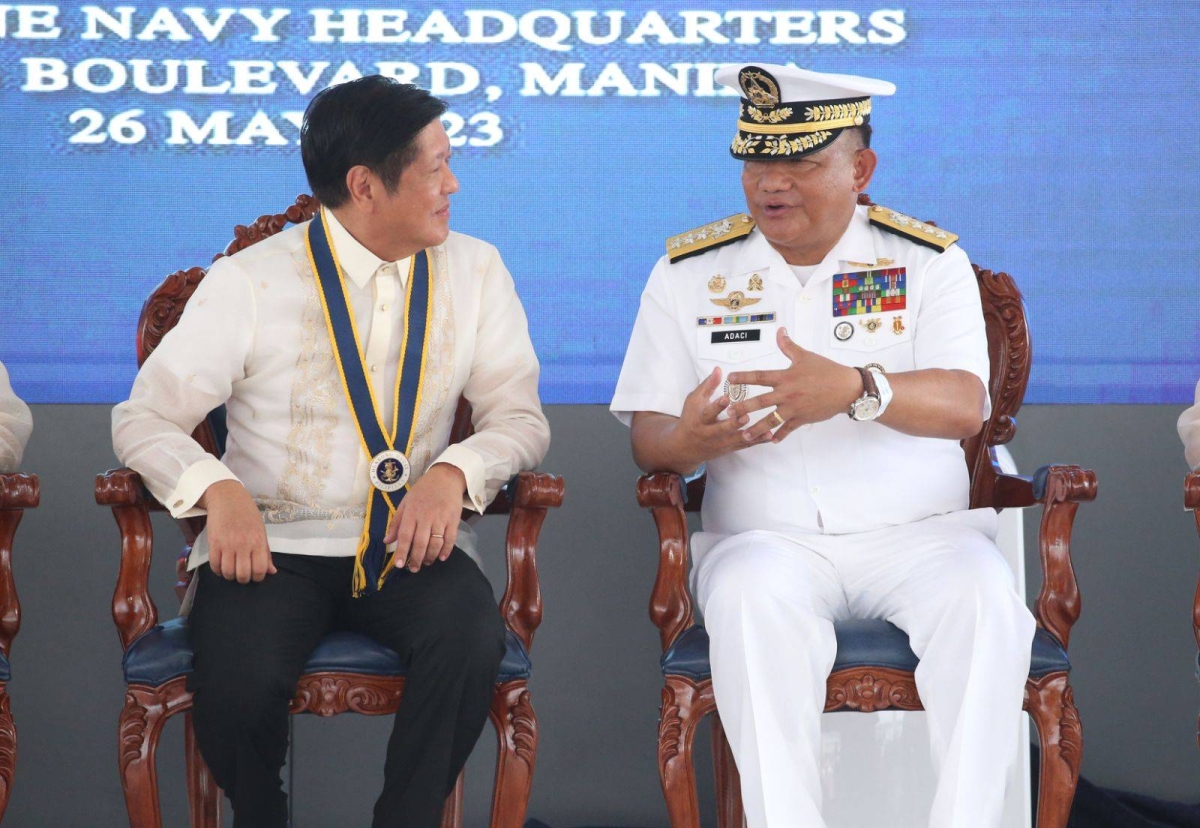 President Ferdinand Marcos Jr. and Philippine Navy officials board one of two new gunboats the Philippines has acquired from Israel and which will, among others, be part of naval patrol in the West Philippine Sea. Marcos commissioned the BRP Gener Tinangag and BRP Domingo Deluana on Friday, May 26, 2023, the 125th anniversary of the Philippine Navy. PHOTOS BY RENE DILAN
President Ferdinand Marcos Jr. and Philippine Navy officials board one of two new gunboats the Philippines has acquired from Israel and which will, among others, be part of naval patrol in the West Philippine Sea. Marcos commissioned the BRP Gener Tinangag and BRP Domingo Deluana on Friday, May 26, 2023, the 125th anniversary of the Philippine Navy. PHOTOS BY RENE DILAN
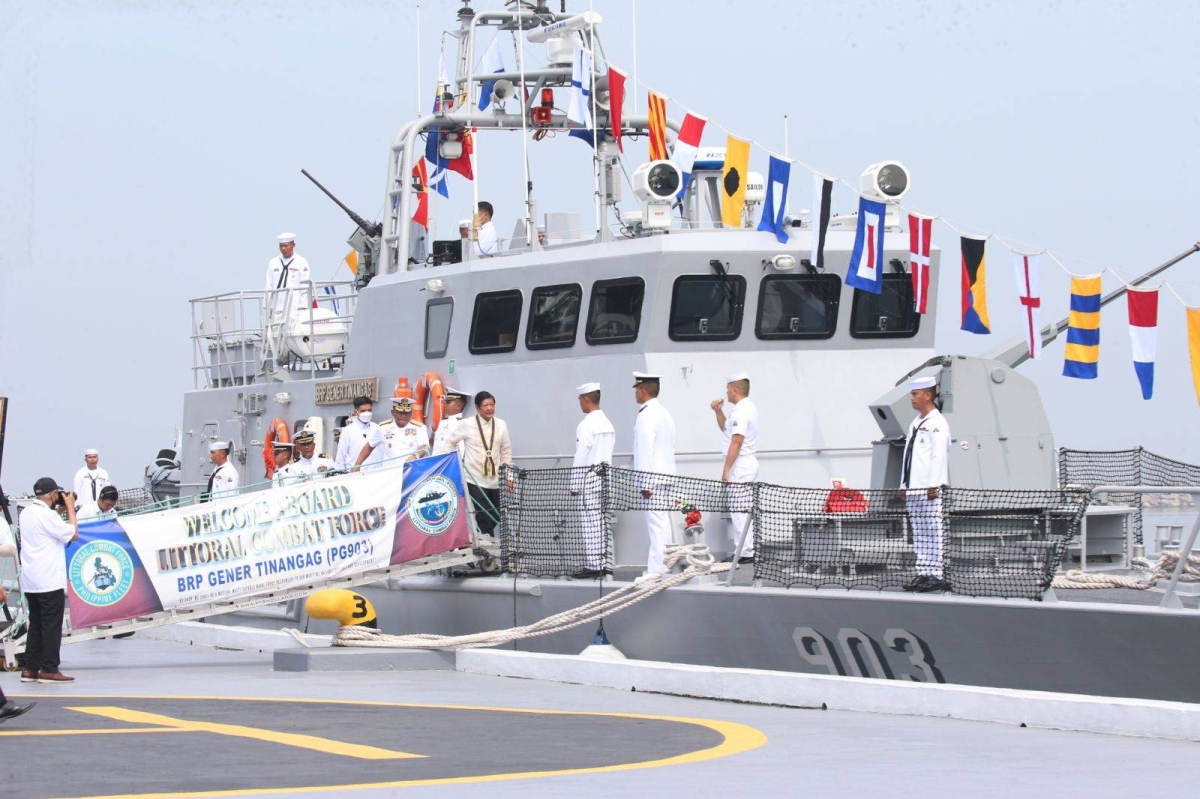 President Ferdinand Marcos Jr. and Philippine Navy officials board one of two new gunboats the Philippines has acquired from Israel and which will, among others, be part of naval patrol in the West Philippine Sea. Marcos commissioned the BRP Gener Tinangag and BRP Domingo Deluana on Friday, May 26, 2023, the 125th anniversary of the Philippine Navy. PHOTOS BY RENE DILAN
President Ferdinand Marcos Jr. and Philippine Navy officials board one of two new gunboats the Philippines has acquired from Israel and which will, among others, be part of naval patrol in the West Philippine Sea. Marcos commissioned the BRP Gener Tinangag and BRP Domingo Deluana on Friday, May 26, 2023, the 125th anniversary of the Philippine Navy. PHOTOS BY RENE DILAN
The gunboats, purchased from Israel for P10 billion, are mainly for territorial and coastal patrol operations, according to the Philippine Navy.
Capable of delivering precision strikes against bigger hostile vessels and high-value targets on land and sea, each of 32-meter-long FAICs is equipped with quick intercept ability, remote stabilized weapons, and short-range missiles.
Their acquisition is part of the Horizon 2 List of the Armed Forces of the Philippines (AFP) Modernization Program.
Marcos said the commissioning of the two vessels will pave the way for the “holistic transformation” of the AFP into “a stronger, modern and formidable organization.”
“We are keenly aware that the national interests are to be pursued in the context of the global order. The seas that stretch before us are not to be seen as boundaries that divide our nations, but they must be seen as channels for mutually beneficial exchanges and collaboration,” he said.
Marcos also acknowledged the Navy’s vital role in the collective effort “to nurture friendly international relations, by fostering mutual trust and confidence, freedom of navigation and overflight, and of course, safety of our seas.”
“Our Navy serves not only as valiant guardians of our seas and shores, but peaceful emissaries as well. Highly disciplined and experienced in international engagements, it adheres to the [internationally] recognized codes of conduct, such as the Unclos (United Nations Convention on the Law of the Sea) and the recently approved Asean (Association of Southeast Asian Nations) Guidelines of Maritime Interaction,” he said.
Marcos lauded the Navy’s accomplishments over the years, especially in securing the archipelago from Batanes and the Kalayaan Islands, the Philippine Rise, to the West Philippine Sea.
“… To the brave men and women of our Navy: in fulfilling your duties and mandates, be agents and exemplars for our citizenry by working for unity and by championing respect for our constitutional order and the rule of law,” Marcos said.
The President also said his administration’s plan to acquire the country’s first-ever submarine.
“There is a plan, but it is still being developed dahil ang commitment para mag-operate ng submarine (because the commitment to operate a submarine) is not a small commitment. It’s a very large commitment because the training that is involved, the equipment that is involved, the operational requirements that are involved are quite significant,” Marcos said.
For the meantime, he said, the government will continue to upgrade the Navy’s anti-submarine capabilities.
The President said there were offers from other countries not only to provide submarines but to build the naval vessels in the Philippines.
Interviewed during the same event, National Security Adviser Eduardo Año said the government’s move to install buoys in the West Philippine Sea was “not done with brute force but with deliberative action buttressed by international and domestic laws.”
“The act of placing navigational buoys in the West Philippine Sea is an act of a sovereign nation and is pursuant to the country’s obligations under international law,” Año said in an interview on the sidelines of the Navy’s anniversary celebration.
“As a maritime nation, it is imperative that the Philippines prioritize the maintenance of navigational safety to ensure the protection of our waters and the people who rely on them. The consequences of neglecting navigational safety can be catastrophic, leading to accidents, loss of life, and damage to the environment,” he said.
Earlier this month, the Philippine Coast Guard (PCG) put up five navigational buoys flying the Philippine flag in critical areas in the West Philippine Sea within the country’s Exclusive Economic Zone (EEZ).
The buoys were placed in the waters off Patag Island, Balagtas (Irving) Reef, Kota Island, Panata Island and Juan Felipe (Whitsun) Reef.
Earlier this week, China announced it has also placed at least three new light buoys in the disputed waters of the South China Sea following similar deployments by the Philippines.
The light buoys were installed also at Balagtas Reef, Julian Felipe Reef and Burgos (Gaven) Reef “to ensure the safety of navigation and maritime operations,” it said.
Año, who is also the National Security Council director general, said safe and efficient navigation is critical to international trade and commerce, the disruption of which can have far-reaching consequences.
“Besides, our maritime borders are vulnerable to threats such as piracy, smuggling, and terrorism. Thus, maintaining navigational safety is critical to safeguarding the nation against these threats,” he said.
Año noted that the PCG has been installing navigational buoys in the West Philippine Sea since last year to fulfill the country’s commitment under international law “to install and maintain these aids to navigation that assist vessels in safe passage in our water.”
He said five buoys have been floating in the waters of Lawak, Likas, Parola, and Pag-asa for over a year now.
Año said the buoys also underscores the country’s adherence to the United Nations Convention on the Law of the Sea, which acknowledges coastal states’ entitlement to manage their EEZs.
— Catherine S. Valente and Franco Jose C. Baroña
*****
Credit belongs to: www.manilatimes.net
 Atin Ito First Filipino Community Newspaper in Ontario
Atin Ito First Filipino Community Newspaper in Ontario






